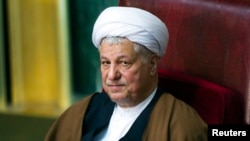Critics of the late Iranian President Akbar Hashemi Rafsanjani are painting a dark picture of the man who helped found the Islamic Republic, in contrast to depictions of him as a pragmatist in some obituaries.
Iranian state media say Rafsanjani was taken to a Tehran hospital on Sunday, suffering from a heart attack, and died later that day. He was 82. State television interrupted programming to announce his death, saying it came "after a life full of restless efforts in the path of Islam and revolution."
Some Western media published obituaries focusing on Rafsanjani’s reputation in Iran as a popular figure of the 1979 Islamic Revolution who evolved into a centrist and champion of Iranian moderates and reformists in his final years. He served two terms as Iranian president from 1989 to 1997.
But two exiled Iranian opposition figures who spoke to VOA’s Persian service Monday highlighted controversial elements of Rafsanjani’s past as they assessed his legacy.
Speaking from Paris, Iran’s first post-revolution President Abolhassan Bani Sadr said Rafsanjani bore a great deal of responsibility for the current state of the country.
“If Iran’s situation is good, then we can say Rafsanjani had a good record; if it is bad, then he is responsible for this condition, even more than (Supreme Leader Ayatollah Ali) Khamenei,” Bani Sadr told VOA Persian’s "New Horizon" program. “Rafsanjani imposed Khamenei on (the Iranian) people with lies and forging a letter.”
Forgery controversy
When Khamenei’s predecessor as supreme leader, Ayatollah Ruhollah Khomeini, died in June 1989, Rafsanjani - then speaker of Iran’s parliament - encouraged the country’s Assembly of Experts to appoint then-Iranian president Khamenei as the next supreme leader, a move the assembly approved. Rafsanjani succeeded Khamenei as president in August 1989.
Iranian democracy activist Mahmood Delkhasteh, writing for The Huffington Post in 2011, said Rafsanjani presented the assembly with a letter purportedly written by Khomeini, saying the next supreme leader did not have to meet the constitutional requirement of being grand ayatollah – a rank then-President Khamenei did not have. Some commentators have said Rafsanjani sought to elevate Khamenei because he mistakenly perceived the president as a weak figure to manipulate.
Delkhasteh said former President Bani Sadr was suspicious of the letter and had it examined by several handwriting experts, who concluded that it was forged by someone much younger than Khomeini, most likely his son. The activist said Iran’s embassy in Paris protested the forgery allegation when it was published by the French newspaper Le Monde in June 1989.
Rafsanjani’s human rights record as Iranian president also faced criticism from Shirin Ebadi, an Iranian democracy activist who won the Nobel Peace Prize in 2003.
Killings on Rafsanjani’s watch
“Unfortunately, Rafsanjani does not have a good record on human rights,” said Ebadi, appearing from London on VOA Persian’s "Newshour" program. “I especially want to point out the case of Iran’s ‘chain murders’ – killings that began when Ali Fallahian was intelligence minister in Rafsanjani’s cabinet and that were ordered by the intelligence ministry.”
Ebadi was referring to the killings of dozens of prominent dissidents and intellectuals in Iran from 1988 to 1998 – a series of incidents that Iranian rights activists have labeled the “chain murders” and blamed on Iranian intelligence operatives.
The Committee to Protect Journalists says Iranian reporters published articles in 1999 linking intelligence operatives to the killings, prompting Iranian authorities the following year to admit that “rogue elements” within the intelligence ministry were responsible for some of the incidents. It is unclear who carried out the other killings.
Ebadi also linked Rafsanjani to two attacks outside Iran in the 1990s: a 1994 suicide car bombing that destroyed a Jewish community center in Buenos Aires and killed 85 people, and a 1992 assassination of four exiled Iranian Kurdish dissidents at a Berlin restaurant called Mykonos.
Argentine prosecutors accused Iran of involvement in the Buenos Aires attack and requested the arrest of nine Iranian officials in connection with it, including Rafsanjani.
German prosecutors also accused Rafsanjani of ordering the Berlin killings. In 1997, a German court ruled that the attack was ordered by the highest figures of the Iranian government but did not name them.
Iran denied responsibility for both attacks.
VOA's Persian's Payam Yazdian and Shepol Ebnabbasi contributed interviews to this report.




